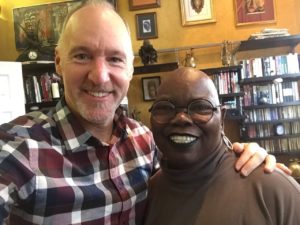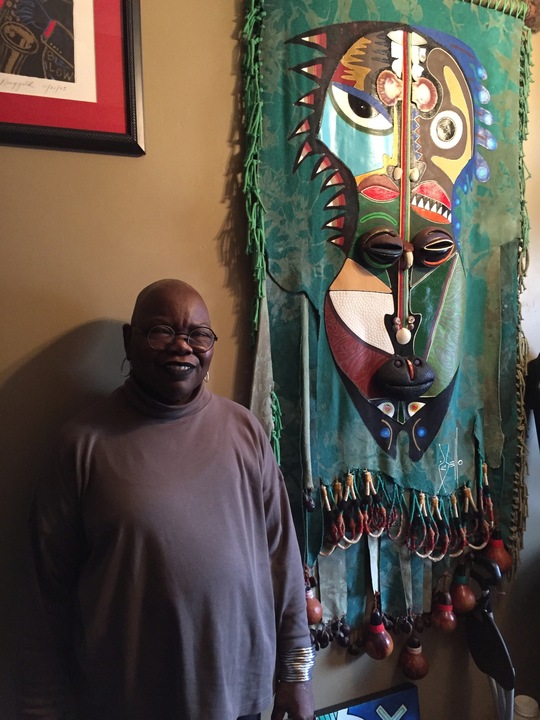JD: I want to use music as a way to help the world come together. In your work with Sweet Honey in the Rock, to what degree does the audience’s presence and intention effect what you do? And how does the music effect the audience? What’s happening?
YB: I did a TED Talk a few years ago about how we’re not singing (as a culture) anymore, and what role music used to play. This year, I did a Community-Sing as my TED Talk. And we did it in the Congressional Room of the Boston’s Edward Kennedy Library. My focus is a discussion of worldview. I realized, at some point, that there’s a Euro-centric view of music and an Afro-centric view. And they are diametrically opposed – one rooted in the note and the other rooted in the sound.
JD: Could you say that the “note” reflects an intellectual understanding, and the “sound” reflects an experiential understanding?
YB: Exactly. The “sound” is about telling our story. And I can’t tell my story very well by myself. And I think this difference is hugely important for musicians to look at.
Why do we make music? What good is a song if it doesn’t inspire? if it has no message to bring? if the song doesn’t take you higher?
What does the musician get out of it, and put into it?
In the African worldview of music, music ties together all of the spiritual dimensions, human dimensions, and historic dimensions together. It documents our everyday life, from music of spirituals to hip hop. Without music, we don’t have our history.
So, a huge difference between these two paradigms is function. The function of African music is to weave us together on a conscious level.

JD: So is music’s purpose to weave together? Is it about communicating something beyond ourselves? Is it about showing emotion, or bringing emotion out?
YB: It’s about all of those things, but also about the way in which we tell our history. The musicians are our library!
JD: In the Western tradition, in the medival age, books like Beowolf were intended to be sung, improvised. And the singer carried the information from village to village.
YB: Yes! And that still happens for us. And this is exactly why I’m so focused on worldview. We can be in the same room, using the same words, and mean something completely different.
JD: How do we bridge that?
YB: With audiences I bridge that by working in the oral tradition. I put together different musics from different periods of our development at African-Americans. I try to show how important function and documentation are. I believe that polyrhythms are the ability to make different structures work together. This is my passion right now.
JD: That’s beautiful! I wonder if you can speak to me about how music often gets viewed as entertainment in our culture. I believe that we, as serious musicians, want to bring great integrity to what we do, not just show off a craft. We want to communicate something. But this is an uphill struggle for us because we run into people who don’t understand the power of what we’re doing. How does one work with that? Can music, itself, have such a strong presence that it can teach the lesson of ‘value’? Do the audiences coming to performances of Sweet Honey in the Rock come looking for entertainment? Do they know they’re going to be asked to get involved?
YB: Well our audiences understand that coming to a Sweet Honey concert is an open experience; one doesn’t come just to listen. We brought up issues, questions, allowing people to contribute their own harmonies. I think most people came to understand that the Sweet Honey experience is a different kind of experience. And being invited to participate like that changes people’s attitude. When we performed in Carnegie Hall, people came ready! People came dressed up to match our amazing costumes we used to wear.
JD: I used to be the Organist at a church in Oakland, CA. One day I told the pastor that I wanted to sing a particular Spiritual during the service, since there was no choir that day. She told me that would be inappropriate since the African-Americans in the congregation might take offense at me singing their music. My response was that I don’t have to be Lutheran to sing Bach! And why should I not be allowed to sing the Spirituals I grew up with (in Virginia)? How do you feel about that?
YB: The word “appropriation” comes to mind. I’m not sure how I feel about that word, but I know that I’ve experienced mis-appropriation. That’s where people do not know the innards of a song. The clearest (and most awful) example is when people say: “Oh, it was a ‘Kum-Ba-Yah’ moment!”
A friend of mine’s mother died. She had requested three songs at her funeral, one of them being Kum-Ba-Yah. The priest, at the church where the funeral was to be held, said that it was inappropriate to sing Kum-Ba-Yah because it was a camp song, not a liturgical song. My friend was crushed and asked me to talk directly to the priest. So I called him up and explained to him that Kum-Ba-Yah is the most sacred invocation that we have in African-American culture. So, in the end, I just lead the song, improvisationally, while everyone was walking out.
Mis-appropriation happens in a number of ways: When songs, which we hold dear, get sung in strange situations, sometimes the delivery is almost comical, sometimes it’s quite sincere. But often people don’t have a frame of reference about what the song was intended to be and intended to do.
It’s very important to look at lyrics. For example, look at “Let us break bread together:” Let us break bread together on our knees, Let us break bread together on our knees. When I fall on my knees with my face to the rising sun, Oh, Lord, have mercy on me.
What??? That song is about Islam coming to the New World!
JD: Ah!!! One faces the rising sun when one faces East and prays to Mecca! That never dawned on me.
YB: There’s all kind of stuff in these lyrics! Many of the spirituals are about the Master/Slave relationship. We still sing these in church all the time even though many African-Americans don’t know what these words mean. We do it as a matter of course. My sense is that a lot of pieces get sung without the singer knowing there is a deep meaning behind the song. When that happens, the person feels free to do it in any style they want. There is a resentment that happens even if we don’t know the deep meaning, because we sense that something is not quite right.
JD: Another example of that is the hymn Lift High the Cross. The refrain says “the love of Christ proclaim ‘till all the world adore his sacred name.” That’s about British imperialism; and it was written at the height of the British Empire. And has that militaristic beat to it.
YB: Wow! Yes. It’s important for us, when we go to the music of other cultures, to understand the etymology.
JD: What I believe we are talking about is the power music has, in and of itself, that we need to connect with.
YB: Yes
JD: We can’t just do it because it’s a pretty tune, or we remember hearing our grandmother singing it. We have to think about what a piece of music is saying, and whether it is expressing who we are. It means not taking anything for granted. It’s not: music as entertainment.
YB: EXACTLY!
JD: Music is a tool.
YB: There is a balm in Gilead to make the wounded whole; There is a balm in Gilead to heal the sin-sick soul.
What is sin-sick? And who are the wounded? The sin-sick are the slave masters. The wounded are the slaves. And Jesus says that there is a thing (a balm) that can heal all of that stuff.
JD: You’ve got to write a book about this!
I had the joy of going to college with Moses Hogan. He was the most brilliant pianist at Oberlin the entire four years I was there. After college, he sort of burned out of that piano world and went back to New Orleans where he eventually started directing choirs, and then, eventually, became the leading arranger of African-American spirituals in the world. I re-connected with him on one of his trips to California, a few years before he died. I was really struck, at the time, how the Spirit can work through him, through each of us, completely without our foreknowledge, and help us touch countless lives.
Clearly the Spirit works through you in the millions of lives you have touched as a musician. As musicians, I think we have this very special role. “To heal the sin-sick soul.” We are here to be an instrument of healing for those who are hurting, and to challenge those that are doing the hurting (many unwittingly). Perhaps our task is to help people understand the patterns that lead to hurt.
YB: I think the interesting thing about the Sweet Honey concerts is that it caused audiences to look at lyrics and texts differently. I want people to have a new frame of reference, a re-interpretation of music. You pay attention to Bob Dylan lyrics because you know he was talking about something.
JD: Where is music going now? I’m concerned that 99% of the music that is happening today happens through electronic speakers. Alice Parker told me that we don’t need Music Directors anymore; we need Song Leaders.
YB: Alice and I are working on a project together, for the past four years. The goal is to teach people to be Song Leaders. Alice and I have different backgrounds and approaches to this subject. I’m more steeped in the oral tradition; Alice comes from the other end of that spectrum.
JD: Why do we want people to be engaged in music?
YB: Because music forces our breath to come together. You breathe together; your hearts beat together. It draws us into community in ways that we aren’t even aware of. There’s something about rhythm, I believe, that pushes our blood flow in the same way.
I stayed up half of the night watching the television following that dreadful shooting in a music venue in Paris. And at some point, someone started to sing the “Marseillaise.” That was the moment when they reclaimed their courage. Everybody joined in! That’s the best example of how music makes us strong and announces who we are. Music defines who people are at any moment in time. I will never forget that.
That’s why I do what I do.

